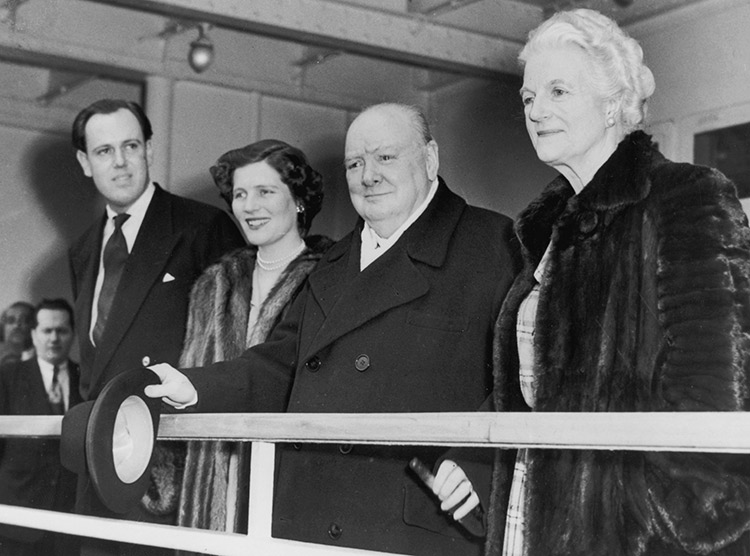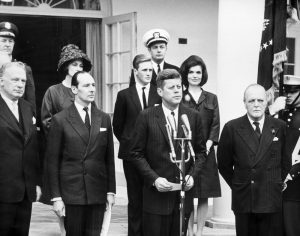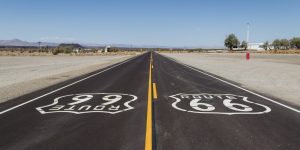
Finest Hour Extras
Winston Churchill in Manhattan, March 25, 1949

Winston Churchill arrives in New York in 1949
February 25, 2023
By Michael J. Birkner, Gettysburg College
Churchill made his sixth peacetime visit to the United States in March 1949. It was meant in part to be an opportunity for relaxing and sightseeing with his wife, Clementine, and daughter Mary. The Churchill party was rounded out by Mary’s husband Christopher Soames, two secretaries, a detective, and a valet. Churchill’s finances were, according to his leading biographer, Martin Gilbert finally “in order,” and he was able to devote attention to the Cold War and the prospects of peace.
It had been nearly fifty-five years since Churchill first crossed the Atlantic, he recalled to an executive of the Cunard White Star Line. His agenda in the states included speeches at a dinner in his honor in New York, an event arranged by TIME/LIFE publisher Henry R. Luce, and another speech at MIT in Boston. This time in New York, Churchill arrived as a world historical figure, whose thoughts on the world situation were naturally sought both in private and public.
For the once and future Prime Minister’s first, semi-public outing–a special dinner in the Oval Room at the Ritz-Carlton, with two hundred guests—Luce spared “no expense,” according to one of the guests, Columbia University Professor Allan Nevins, an ardent Anglophile. It was, in Nevins’ words, “a sumptuous affair” held in “the most beautiful room in New York.” Under the arrangement agreed upon in advance, speakers included Luce and New York Governor Thomas E. Dewey, followed by Churchill. Reporters were admitted, but the press was cautioned that all remarks were off the record. As a consequence, Nevins noted, “Churchill and Dewey talked as informally as if they were in some big drawing room surrounded by friends.”

2025 International Churchill Conference
Whatever “informal” remarks Churchill made that evening had in fact been well prepared. In the eighth-volume of his authoritative biography and his book Churchill and America, Martin Gilbert highlighted Churchill’s expressed gratitude to the American people, “for all you have done and are doing,” notably including the Marshall Plan. But Churchill had a more pungent followup. He referred to a speech he had made in Brussels, suggesting that his European auditors were fearful, but at the same time hopeful knowing the United States was on their side, as Churchill assured them was the case. “I know you will not let them down in regard to any matter in which you have pledged the word of the great Republic,” Churchill told the Ritz-Carlton audience.
He then observed that if the U.S. stayed strong and stood firm, that was the “surest road to peace.” Comparing German Nazism with Soviet Communism, and finding the latter even more of a threat to democracy, Churchill made this striking statement:
We are now confronted with something which is quite as wicked but much more formidable than Hitler, because Hitler had only the Herrenvolk stuff and anti-Semitism. Well, somebody said about that—a good starter, but a bad stayer. That’s all he had. He had no theme. But these fourteen men in the Kremlin have their hierarchy and a church of Communist adepts whose missionaries are in every country as a fifth column, and not only a firth column, in our country, ours, everywhere, and so on, with a feeling that they may be running a risk, but if their gamble comes off, they will be the masters of the whole land in which they are a minority at the present time. They will be the Quislings with power to rule and dominate all the rest of their fellow countrymen.”
Thank God, Churchill said, for the atom bomb in American hands. “That is my firm belief.”
The full text of Churchill’s New York address can be found in a volume of speeches edited by his son Randolph. What adds a fresh dimension to this otherwise little known Churchilliana is the extended diary account of it by Allan Nevins, himself a firm Anglophile who had spent close to two years in England, first at the outset of World War II, and then at its close, always working for closer connections between the British and American people.
Nevins’s diary provides a soup to nuts account of the dinner, starting with his mention of a “smart shower of rain” and picket lines of “Commies and fellow travelers” he had to pass through to enter the building. In the run up to dinner, drinks and “the best caviar” were served. Nevins made his way to one corner where Churchill, “slouched own comfortably in a big settee with Barney [Bernard] Baruch beside him and my old friend [Sir Oliver] Franks, the British Ambassador, hovering in the foreground.” Luce was there as well. He introduced Nevins to Churchill, who afforded Nevins a “moist handshake,” but evidently no comment.
Dinner—breast of pheasant was the main course—was followed by the speech making, Luce calling attention to special guests, then introducing the evening’s main attraction. “Everybody stood as Churchill got slowly and rather ponderously to his feet,” Nevins noted. “He looked pink—not ruddy, simply pink—and healthy. . . . In general [Churchill] looks benignly reflective. But when an amusing thought strikes him, he delivers it with a puckish look; and when he warms up to good fighting sentence, he juts out his chin, puts a stern glare into those dark eyes, and suddenly turns into a very belligerent John Bull.”
Nevins took note of Churchill’s practiced gestures, how he raised his arms “as if he were lifting some heavy bowl.” Reaching a key point, he would “suddenly clench both his outstretched fists and pushed them forward as if he were thrusting somebody out of the way. Now and then he gripped his coat lapels with his hands. Frequently he would simply saw the air, very deliberately, with them both.”
Churchill had notes, to which he’d refer occasionally, “but he never paused in his slow speech except to wait for the applause which always followed a good point. . . . He has a way,” Nevins added, “of beginning his sentences deliberately, halting when he gets half-way through, and then bringing out the rest in a forcible rush, with a heightened emphasis and a fighting tone of voice; that is, with sort of truculent snarl in a way he throws out his final phrase. That trick is highly effective. The audience hung on him with something more than admiring attention. As I looked around the room, I could see most people beaming at Churchill, their faces lighted up by a glow of warm appreciation, almost of affection.”
On concluding, Luce and Dewey spoke of Americans’ affection for Churchill, leading the latter to rise one more time, but assuring the audience, “I am not going to make another speech.” “I have heard some complimentary speeches here tonight,” he said, “of the kind that a man ought not to hear until after he is dead.”
Nevins’s diary provides his own summary of Churchill’s half hour talk, noting the Briton’s reference to his speech in Fulton, Missouri (“The iron curtain speech”) and how time had justified it. It was Russian aggressive behavior that united the free world against tyranny. As for the Russian leader cohort, Churchill suggested that they were “far more afraid of our friendship than of our enmity. Our friendship and a free intercourse between East and West would be fatal to them. . . . They must have our enmity; they must have means of sealing themselves off from the rest of the world.”
Nevins continued by picking up on the point that Martin Gilbert later emphasized: Churchill’s conviction that if the U.S. had not developed the A-bomb, world history would have taken, in Churchill’s estimation, “a terrible turn.” Churchill even suggested that if the Russians had first developed the A-bomb, they would have used it for world conquest.
In praising NATO Churchill urge Americans, in Nevins’ summary, “to support it with all their might.” He went on to pay tribute to General Douglas MacArthur’s stewardship as head of the Allied occupation of Japan, eliciting audience applause.
“Though his manner and style were conversational—not oratorical, not rhetorical—he struck off some good phrases,” Nevins concluded. Among them were this reference to defeated Germany: “I have always thought that when we knock a man down, we ought to help him up again—in a different frame of mind.” One of more than two hundred speeches Churchill delivered between his two tenures as Prime Minister, the Ritz Carlton address was an undeniable success—but also one of the least reported.
As the event concluded, Allan Nevins departed with prominent attorney John W. Davis, a former Democratic Presidential candidate in 1924. The pickets were gone, but “a big crowd was waiting on both sides of the street in the rain, hoping for a glimpse of Churchill.”
Nevins’s diary entry is located in the Allan Nevins Papers, Box 32, Columbia University Special Collections.
Subscribe
WANT MORE?
Get the Churchill Bulletin delivered to your inbox once a month.





